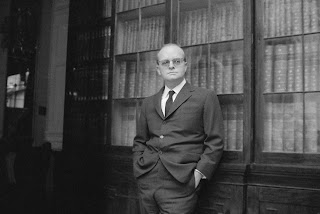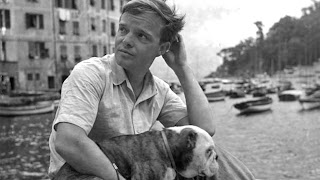 |
| Truman Capote |
He and The Grandma have in common their passion for Literature and they have decided to talk about Truman Capote the American writer, a great genius of nonfiction novel who was born on a day like today in 1924. Capote was a controversial writer whose legacy is still alive and whose works are a must of Universal Literature. The Grandma has remembered one of her favourite films, a Neil Simon's murder mystery Murder by Death (1976) where Capote has a main role as an actor.
Truman Garcia Capote (September 30, 1924-August 25, 1984) was an American novelist, short story writer, screenwriter, playwright, and actor.
Several of his short stories, novels, and plays have been praised as literary classics, including the novella Breakfast at Tiffany's (1958) and the true crime novel In Cold Blood (1966), which he labeled a nonfiction novel. At least 20 films and television dramas have been produced from his work.
Capote rose above a childhood troubled by divorce, a long absence from his mother, and multiple migrations. He had discovered his calling as a writer by the age of 8, and for the rest of his childhood he honed his writing ability.
Capote began his professional career writing short stories. The critical success of one story, Miriam (1945), attracted the attention of Random House publisher Bennett Cerf, and resulted in a contract to write the novel Other Voices, Other Rooms (1948).
Capote earned the most fame with In Cold Blood, a journalistic work about the murder of a Kansas farm family in their home. He spent four years writing the book aided by his lifelong friend Harper Lee, who wrote To Kill a Mockingbird (1960).
A milestone in popular culture, In Cold Blood was the peak of Capote's literary career. In the 1970s, he maintained his celebrity status by appearing on television talk shows.
Born in New Orleans, Louisiana, Capote was the son of 17-year-old Lillie Mae Faulk (1905-1954) and salesman Archulus Persons (1897-1981). His parents divorced when he was 4, and he was sent to Monroeville, Alabama, where, for the following four to five years, he was raised by his mother's relatives. He formed a fast bond with his mother's distant relative, Nanny Rumbley Faulk, whom Truman called Sook. Her face is remarkable -not unlike Lincoln's, craggy like that, and tinted by sun and wind, is how Capote described Sook in A Christmas Memory (1956). In Monroeville, he was a neighbor and friend of author Harper Lee, who probably based the character Dill on Capote.
In 1932, he moved to New York City to live with his mother and her second husband, José García Capote, a Canarian-born textile broker from La Palma, who adopted him as his stepson and renamed him Truman García Capote. However, José was convicted of embezzlement and shortly afterwards, when his income crashed, the family was forced to leave Park Avenue.
More information: The New York Times
While still attending Franklin in 1942, Capote began working as a copyboy in the art department at The New Yorker, a job he held for two years before being fired for angering poet Robert Frost.
Years later, he reflected, Not a very grand job, for all it really involved was sorting cartoons and clipping newspapers. Still, I was fortunate to have it, especially since I was determined never to set a studious foot inside a college classroom. I felt that either one was or wasn't a writer, and no combination of professors could influence the outcome. I still think I was correct, at least in my own case. He left his job to live with relatives in Alabama and began writing his first novel, Summer Crossing.
Capote based the character of Idabel in Other Voices, Other Rooms on his Monroeville neighbour and best friend, Harper Lee. Capote once acknowledged this: Mr. and Mrs. Lee, Harper Lee's mother and father, lived very near. She was my best friend. Did you ever read her book, To Kill a Mockingbird? I'm a character in that book, which takes place in the same small town in Alabama where we lived. Her father was a lawyer, and she and I used to go to trials all the time as children. We went to the trials instead of going to the movies. After Lee was awarded the Pulitzer Prize in 1961 and Capote published In Cold Blood in 1966, the authors became increasingly distant from each other.
 |
| Truman Capote |
Between 1943 and 1946, Capote wrote a continual flow of short fiction, including Miriam, My Side of the Matter, and Shut a Final Door, for which he won the O. Henry Award in 1948, at the age of 24. His stories were published in both literary quarterlies and well-known popular magazines, including The Atlantic Monthly, Harper's Bazaar, Harper's Magazine, Mademoiselle, The New Yorker, Prairie Schooner, and Story. In June 1945, Miriam was published by Mademoiselle and went on to win a prize, Best First-Published Story, in 1946. In the spring of 1946, Capote was accepted at Yaddo, the artists and writers colony at Saratoga Springs, New York.
Random House, the publisher of his novel Other Voices, Other Rooms, moved to capitalize on this novel's success with the publication of A Tree of Night and Other Stories in 1949. In addition to Miriam, this collection also includes Shut a Final Door, first published in The Atlantic Monthly (August 1947).
After A Tree of Night, Capote published a collection of his travel writings, Local Color (1950), which included nine essays originally published in magazines between 1946 and 1950.
More information: The Guardian
A Christmas Memory, a largely autobiographical story taking place in the 1930s, was published in Mademoiselle magazine in 1956. It was issued as a hard-cover stand alone edition in 1966 and has since been published in many editions and anthologies.
Some time in the 1940s, Capote wrote a novel set in New York City about the summer romance of a socialite and a parking lot attendant. Capote later claimed to have destroyed the manuscript of this novel; but twenty years after his death, in 2004, it came to light that the manuscript had been retrieved from the trash back in 1950 by a house sitter at an apartment formerly occupied by Capote.
 |
| Truman Capote |
Capote described this symbolic tale as a poetic explosion in highly suppressed emotion. The novel is a semi-autobiographical refraction of Capote's Alabama childhood.
In the early 1950s, Capote took on Broadway and films, adapting his 1951 novella, The Grass Harp, into a 1952 play of the same name, later a 1971 musical and a 1995 film, followed by the musical House of Flowers (1954), which spawned the song A Sleepin' Bee. Capote co-wrote with John Huston the screenplay for Huston's film Beat the Devil (1953). Traveling through the Soviet Union with a touring production of Porgy and Bess, he produced a series of articles for The New Yorker that became his first book-length work of nonfiction, The Muses Are Heard (1956).
In this period he also wrote an autobiographical essay for Holiday Magazine -one of his personal favorites- about his life in Brooklyn Heights in the late 1950s, entitled Brooklyn Heights: A Personal Memoir (1959).
More information: Factinate
Breakfast at Tiffany's: A Short Novel and Three Stories (1958) brought together the title novella and three shorter tales: House of Flowers, A Diamond Guitar and A Christmas Memory. The heroine of Breakfast at Tiffany's, Holly Golightly, became one of Capote's best known creations, and the book's prose style prompted Norman Mailer to call Capote the most perfect writer of my generation.
The new book, In Cold Blood: A True Account of a Multiple Murder and Its Consequences (1965), was inspired by a 300 word article that ran in the November 16, 1959 The New York Times. The story described the unexplained murder of the Clutter family in rural Holcomb, Kansas, and quoted the local sheriff as saying, This is apparently the case of a psychopathic killer.
 |
| Truman Capote |
La Côte Basque 1965 was published as an individual chapter in Esquire magazine in November 1975. The catty beginning to his still-unfinished novel, Answered Prayers, marks the catalyst of the social suicide of Truman Capote.
In the late 1970s, Capote was in and out of drug rehabilitation clinics, and news of his various breakdowns frequently reached the public.
Andy Warhol, who had looked up to the writer as a mentor in his early days in New York and often partied with Capote at Studio 54, agreed to paint Capote's portrait as a personal gift in exchange for Capote's contributing short pieces to Warhol's Interview magazine every month for a year in the form of a column, Conversations with Capote.
More information: Learning English
After the revocation of his driver's license, the result of speeding near his Long Island residence, and a hallucinatory seizure in 1980 that required hospitalization, Capote became fairly reclusive. These hallucinations continued unabated and medical scans eventually revealed that his brain mass had perceptibly shrunk.
On the rare occasions when he was lucid, he continued to promote Answered Prayers as being nearly complete and was reportedly planning a reprise of the Black and White Ball to be held either in Los Angeles or a more exotic locale in South America.
On a few occasions, he was still able to write. In 1982, a new short story, One Christmas, appeared in the December issue of Ladies' Home Journal; the following year it became, like its predecessors A Christmas Memory and The Thanksgiving Visitor, a holiday gift book.
In 1983, Remembering Tennessee, an essay in tribute to Tennessee Williams, who had died in February of that year, appeared in Playboy magazine.
Capote died in Bel Air, Los Angeles, on August 25, 1984, a month before his 60th birthday.
More information: Archive
To me, the greatest pleasure of writing is not what it's about,
but the inner music that words make.
Truman Capote

No comments:
Post a Comment